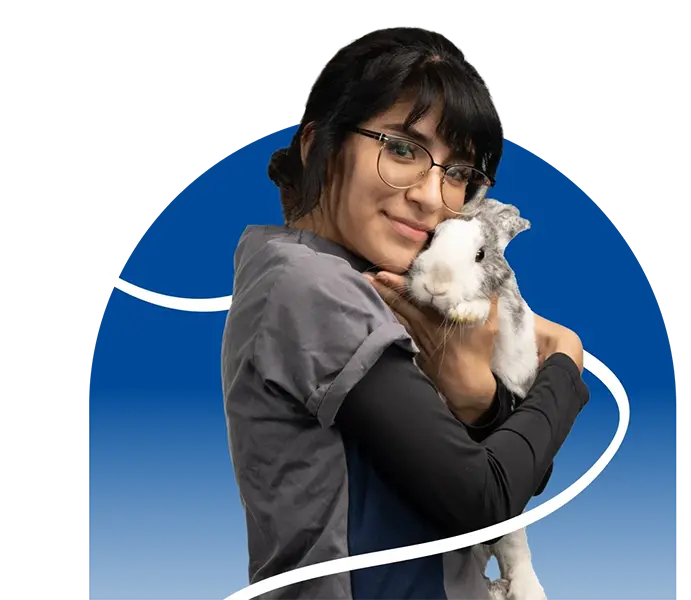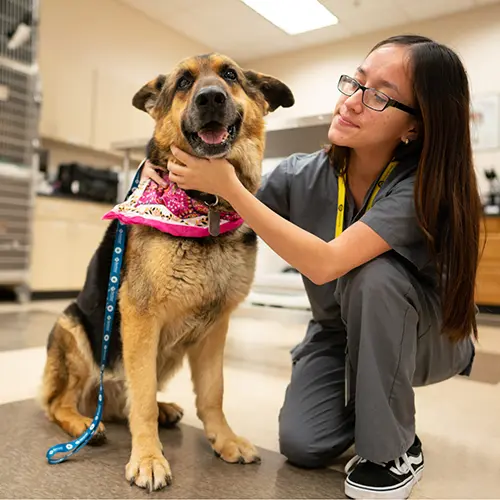Veterinary Assisting / Veterinary Assistant


Program Details
What Will I learn
Carrington College’s Veterinary Assisting program provides the clinical, laboratory, and administrative skills to support veterinarians in a variety of settings. Upon completion of the Veterinary Assisting program, graduates will be able to:
- Complete appropriate veterinary assisting procedures related to animal husbandry, diagnostics, equipment maintenance and client care in a variety of settings.
- Apply basic knowledge of animal anatomy and physiology of multiple species in relation to animal care.
- Maintain a professional and safe work environment.
Upon completion of the Veterinary Assistant program, graduates will be able to:
- Perform the duties pertaining to veterinary clinic reception, office management, and general computer skills.
- Perform the various duties of a veterinary assistant, such as venipuncture, administering of injections, placing of IV catheters, and the monitoring of anesthesia in a surgical setting.
- Perform dental prophylaxis, with capability to instruct and demonstrate in-home dental care, providing detailed explanation for future recommendations.
- Perform and apply laboratory procedures, as well as radiographic film processing regarded as diagnostic contributions in animal healthcare.
- Demonstrate confidence in the execution of exam room protocols, such as proper pet restraining techniques, obtaining vitals, accurate recording of patient history and client communication within the examination process.
- Relate and apply concepts of communication, reasoning, critical analysis, ethical behavior and appropriate interpersonal interaction to situations in his or her career and personal life.
- Demonstrate the social skills, professional appearance, attitudes and behavior that employers expect of graduates.
With comprehensive hands-on training and a strong foundation in veterinary care, this program prepares students for entry-level roles in veterinary clinics, hospitals, and animal care facilities.
Location Availability
Carrington College’s Veterinary Assisting/Veterinary Assistant programs are available at multiple locations in Arizona, California, Oregon and Washington. Program availability varies by location. To learn more about each location, explore their location pages.
Accreditation & Approvals
Carrington College is accredited by the Accrediting Commission for Community and Junior Colleges, 428 J Street, Suite 400, Sacramento, CA 95814; 415 506 0234 an institutional accrediting body recognized by the Council for Higher Education Accreditation and the U.S. Department of Education. Additional information about accreditation, including the filing of complaints against member institutions, can be found at accjc.org.
For comprehensive information on Carrington College’s accreditation and approvals, visit carrington.edu/accreditation-and-approvals/.
Course Catalog
Program Specific Disclosures
Continuing Education For Graduates
Student Outcomes
Upon completion of the Veterinary Assisting program, graduates will be able to:
- Complete appropriate veterinary assisting procedures related to animal husbandry, diagnostics, equipment maintenance and client care in a variety of settings.
- Apply basic knowledge of animal anatomy and physiology of multiple species in relation to animal care.
- Maintain a professional and safe work environment.
REAL WORLD SKILLS
START YOUR PATH
FLEXIBLE LEARNING OPTIONS
AFFORDABLE TUITION
Request Information
All fields using an asterik (*) are required.
Discover What It’s Like to Train to Become a Veterinary Assistant at Carrington College
Milayna J.
2020 Veterinary Assisting Graduate
What Will I Learn?
Veterinary Surgical and Assisting Techniques
Veterinary Hospital Practices
Animal Nursing and Care
Check out our guide on becoming a Veterinary Assistant.
Have you always wanted to work in a veterinary setting, but don’t want to attend school for years? Then a job as a veterinary assistant might be a good career for you. Veterinary assistants work in a variety of roles in veterinary offices and clinical settings supporting the licensed staff with technical tasks.